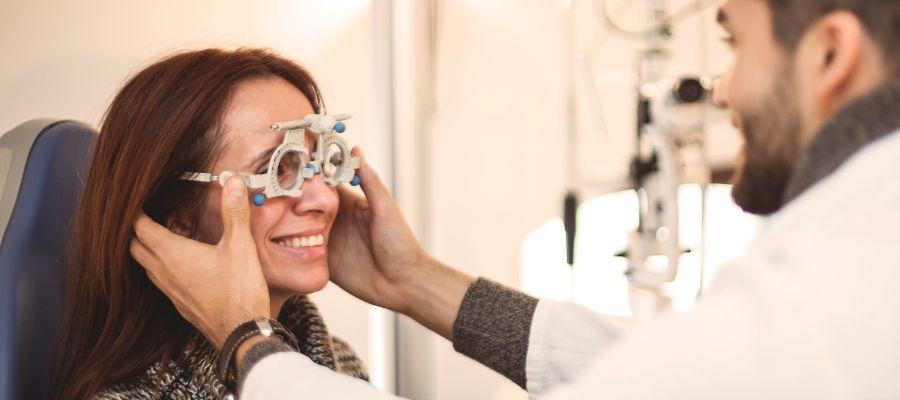
Can An Eye Doctor Detect Other Health Conditions During An Eye Exam?
Ever thought beyond the scope of vision correction during an eye exam? If not, then you're in for a startling revelation. Your visit to an eye doctor isn't just about updating your spectacles or relieving that stubborn eye itch; it can be an avenue for detecting other underlying health conditions. At 50 Dollar Eye Guy, Dr. Joseph Tegenkamp combines his friendly demeanour with his professional expertise to offer more than just superficial eye care. Using comprehensive eye exams, he can identify potential health issues, helping you stay one step ahead. So, why not make an appointment today? Beyond fashionable eyewear and superior vision care, it could be your gateway to overall wellness.
The Importance of Regular Eye Exams
Understanding the need for eye examinations
You've probably heard the phrase, "Eyes are the windows to the soul." They can also be windows to your health. Regular eye examinations aren't just crucial for maintaining good vision and tracking any changes in your eyesight. They're also critical in spotting early signs of various health conditions, sometimes even before other symptoms emerge.
The role of eye exams in overall health maintenance
Believe it or not, routine eye exams can play a significant role in maintaining your overall health. These comprehensive assessments constitute more than just eye health check-ups; they can often serve as a preliminary diagnostic tool for identifying underlying systemic conditions.
The Comprehensive Eye Exam Explained
The process of a comprehensive eye exam
When you participate in a comprehensive eye exam, your optometrist will conduct a thorough inspection of your vision and eye health. This typically includes a vision test to identify any need for corrective lenses, eye coordination assessment, and in-depth observation of the eyes' interior and exterior.
The different procedures involved in an eye exam
An eye exam includes several procedures, such as visual acuity tests, retinoscopy, refraction testing, visual field testing, and slit-lamp examination. They also involve examining the ocular health of the patient, checking for eye pressure, and assessing peripheral vision. The aim is to get a detailed view of your eye health and evaluate any potential risks or issues.
The Role of Eye Doctors in Disease Detection
How an optometrist can pinpoint health conditions
Optometrists possess unique skills and knowledge to conduct comprehensive eye exams. By examining different parts of the eye, they can detect various changes or anomalies linked to health conditions beyond vision impairment. These can range from autoimmune disorders to neurological or cardiovascular diseases.
The knowledge and skills of eye doctors
Eye doctors are specifically trained to spot the subtle changes in your eyes that might point to an underlying health issue. Their extensive knowledge and understanding of both the physiology of the eyes and general health conditions make them an invaluable asset in the early identification and management of both ocular and systemic diseases.
The Correlation Between Eye Health and General Health
Connections between eye health and general health
There is an undeniable link between eye health and general health. Issues like blurry vision, dry eyes, or even inflammation can often hint at deeper health problems. Certain conditions, like diabetes or hypertension, often first manifest themselves through anomalies in the eye.
How eye health reflects overall well-being
Just like the state of your skin or your hair, the state of your eyes can often be a mirror reflecting your overall well-being. Inflammation, blood vessel changes, or unusual spots in your eyes could be indicative of conditions ranging from nutritional deficiencies to more severe systemic health issues.
Specific Health Conditions Detectable Through Eye Exams
Diabetes diagnosis through an eye exam
Blood vessel changes in the retina can indicate diabetes. Known as diabetic retinopathy, this condition can be detected during an eye exam even before you become aware of any problems or start showing other symptoms of diabetes.
Detecting Hypertension via an eye test
Blood vessel changes can also point to hypertension. Narrowing of the arterioles or signs of bleeding in the eye are common indicators of high blood pressure or related conditions that an eye doctor can pick up during a comprehensive eye exam.
Identifying signs of Cancer during an eye exam
Certain cancers, such as lymphoma, can sometimes be first discovered in an eye exam. An eye doctor might notice irregularities such as growths, changes in the structure of the eye, or unusual inflammation indicative of malignancy.
Autoimmune Diseases and Eye Tests
Early detection of Multiple Sclerosis through eye exams
An eye exam can also point towards conditions like Multiple Sclerosis (MS). Symptoms such as optic neuritis, which involves inflammation of the optic nerve, are common in MS patients and can be identified through a comprehensive eye exam.
How Rheumatoid Arthritis can be detectable in an eye exam
Rheumatoid Arthritis (RA) can often be linked to eye conditions such as scleritis, which causes painful inflammation of the white part of the eye. Regular eye exams can help in early detection and appropriate referral for further medical evaluation.
Eye Exams and Neurological Conditions
Diagnosing Brain Tumors through eye exams
In some cases, a brain tumor may cause increased intracranial pressure, which can lead to swelling of the optic nerve, a condition detectable via an eye exam. Signs might include blurred vision, double vision, or even loss of peripheral vision.
Discovering signs of Stroke during an eye exam
Small, silent strokes can be challenging to recognize based on symptoms alone. However, these strokes often cause damage to the blood vessels of the eyes, which can be detected during a comprehensive eye examination.
Eye Exams and Cardiovascular Disorders
Detecting Atherosclerosis with an eye test
Atherosclerosis, the buildup of fatty deposits in your arteries leading to cardiovascular disorders, can cause changes in the blood vessels in the retina, which your optometrist can spot during an eye exam.
Identifying signs of High cholesterol through an eye exam
High cholesterol, a known risk factor for heart disease, can often be detected in an eye exam. Signs can include a bluish ring around your cornea or yellowish cholesterol deposits on your eyelids.
Eye Exams and Infectious Diseases
Discovering signs of Lyme Disease in an eye exam
Symptoms of Lyme disease can sometimes surface within the eyes. Indicators such as inflammation, light sensitivity, blurred vision, and others can be picked up in a meticulous eye exam.
The role of eye exams in detecting HIV/AIDS
Regular eye exams can help detect certain eye conditions associated with HIV/AIDS, such as cotton wool spots, microaneurysms, and retinal hemorrhages, offering crucial clues about the diagnosis and management of this systemic condition.
The Future of Eye Exams in Healthcare
Innovation in eye exams for disease detection
As technology advances, so does the potential for innovation in eye exams. It's likely that future eye exams will not only be even more detailed but may also incorporate advanced technology for early detection and monitoring of chronic diseases, and possibly genetic disorders.
Expected advancements in the optometry field
The optometry field is continually evolving, with expected advancements likely to make eye exams even more central in disease detection and general healthcare. Developments in imaging technology, for instance, could provide even sharper insights into the eye's structure and function, helping doctors catch diseases much earlier and with greater accuracy.
In conclusion, regular eye examinations are essential, not just for good vision, but for overall health. So make sure to get your eyes checked regularly. After all, early detection can often mean the difference between effective management and serious health problems.





